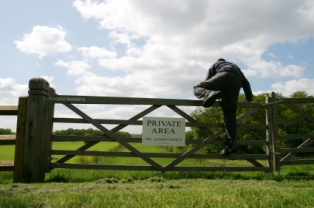Rural crime is on the increase. This is mostly due to the isolation and ease of access to farms and the portable nature and high value of its livestock and farming equipment. Hobby farms in particular are at high risk of theft as owners are often absent while such farms are usually located within close proximity to towns or cities.
Although it’s impossible to prevent all rural crime, being vigilant of farm security and implementing prevention strategies will lower the risk of it happening.
Identifying and recording livestock
The increased value of livestock has brought with it an increase in livestock theft. Animal theft can range from a single ute load by opportunistic thieves through to semi-trailer loads being stolen by well-organised groups targeting rural areas.
Livestock theft prevention strategies:
- Correctly identify and tag all animals with the correct National Livestock Identification (NLIS) and ear mark. Ear marks are the only permanent markings on most livestock and are an essential back-up identification method to the NLIS system.
- Maintain accurate stock records showing the number of births, deaths and sales for each class of livestock for each year.
- Close and padlock gates that provide access to the property.
- Locate loading ramps and yards in clear sight.
 |
Marking and recording hobby farm equipment
Anything that can be quickly and easily loaded onto a utility vehicle will be an inviting temptation for thieves. High risk items include farm equipment such as tools, generators, fencing materials, fuel and motorbikes.
Farm equipment theft prevention strategies:
- Mark and retain a list of all equipment. Use both paint and an engraver to mark each item of farm equipment. This identification will be required if the equipment is stolen and needs to be identified. Also record all serial numbers, places and dates of purchase and photographs as evidence of ownership.
- Remove keys from farm equipment. If you plan to be away for a long period consider removing the spark plug or battery.
- Don’t leave farm equipment in the paddock overnight. If it is necessary, then ensure the equipment can be seen from the house.
- Keep fuel tanks locked. As the price of fuel has increased so too has its popularity with thieves. Ensure fuel tanks are located in a highly visible area.
House and shed security
Farm houses and sheds, especially those that are used infrequently, provide thieves with an easy target. Anything that can be done to increase visibility, night or day, can help protect property. The use of sensor lights that shine on the yard or building will draw attention to a potential thief and may be enough of a deterrent.
Other actions to protect sheds and houses from crime:
- Keep doors and windows locked and secure. Avoid using obvious hiding places for keys, such as underneath the door mat or above the door frame.
- Keep a dog. A dog in a secured yard can make plenty of noise that may distract or deter a thief.
- Work with neighbours to keep an eye out for strange people or vehicles (record registration plates). Let neighbours know your whereabouts and if crime exists in the area, consider starting a neighbourhood watch program.
Farm security cameras
In recent years, farm security cameras have become very popular with absentee farm owners. Most cameras that run on battery or solar power are capable of capturing still images or video with a range of 10-20 metres, depending on the size of the object. Some models are equipped with infra-red, enabling images to be captured in complete darkness. Infra-red can be either visible (dull red glow) or invisible (no-glow) whilst the camera is capturing an image.
Cameras can be triggered by motion (humans, cars, wildlife) or set up to record still images over time. Most models are wireless (SD card) and weather proof, making relocation quick and easy. More expensive farm security cameras come with an inbuilt modem capable of remotely sending site images.
Insurance for hobby farms
Another way to protect your farm and equipment is by taking out hobby farm insurance. Most large insurance providers offer farm insurance and it is usually cost effective when compared to the replacement value of stolen goods. If you already have hobby farm insurance in place, check that the sum insured is adequate for the replacement value of the goods.
Where to from here?
If you are unfortunate enough to be a victim of crime, regardless of size, you should report it immediately to police and provide accurate and detailed information. Actions undertaken directly after a theft will impact on the solving of the crime and possibly help solve others.
About the author
The author Charlie Roberts is one of the FarmStyle Australia experts, he runs this website and has a Bachelor of Farm Management and a Masters of Business Administration. He has worked for a number of agricultural companies in both New Zealand and Australia. He has a wealth of experience working with farmers in a range of environments.



